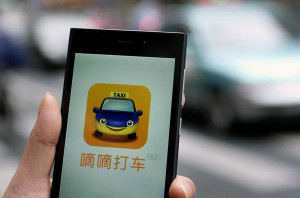Leading China car transportation apps Didi Dache (a taxi hailing tool) and Kuaidi Dache (a car service app like U.S.-based Uber or Lyft) recently announced a plan to merge and create a new challenge for Uber Technologies Ltd.’s global expansion.
Didi Dache, backed by Internet giant Tencent Holdings Ltd. and Kuaidi Dache, backed by rival Alibaba Group, command about 99 percent of the taxi and car service market in China and are used mostly by taxi drivers.
Executives from the two companies said in an announcement that they will share management of the newly merged firm with the brands retaining their own corporate identities with a formal announcement expected soon.
CHANGING WINDS
Industrial experts said that taxi-hailing apps will challenge established companies.
While passengers will reap the benefits of convenience and cheaper fares from the new merger, established taxi giants will not be so fortunate.
One of the most lucrative businesses in China are taxis services which reap considerable profits each year from exclusive government deals, but offer little in return for the end users.
The sector was untouched by the economic downturn as passengers had no other alternative and most cab drivers’ operation licenses were linked to companies.
However after Kuaidi and Didi both launched ride-on-demand services last year, clients left traditional companies for better service and a more comfortable ride.
The apps generally provide two types of service which are the taxi-hailing features, a welcomed idea by cab drivers which ensures passengers are picked up by licensed cabs. Second is the more expensive ride-on-demand service, which offers higher quality vehicles that are owned by car-rental companies.
In east China’s Hangzhou City, where Kuaidi’s headquarters are located, its ride-on-demand service has 4,000 cars which account for nearly 40 percent of all licensed cabs. Cab drivers are already plagued by high contract fees and some chose to go on strike for three days in August over falling passengers numbers which they blamed the apps for.
Zhang Xu from Analysis International described the apps as a breath of fresh air in the rigid transportation sector. Industrial experts believed the merger will compel taxi firms to restructure.
A VIEW TO PROFIT
Didi and Kuaidi invested heavily to secure a market share last year, awarding both passengers and taxi drivers huge subsidies. But neither managed to discover a feasible way to make profits, resulting in the unexpected merger.
In the first six months of 2014, Alibaba-backed Kuaidi Dache subsidies amounted to 1 billion yuan (around $163 million), while Tencent-backed Didi Dache subsidies cost it 1.4 billion yuan.
Understandably, the firms gradually reduced their subsidies in the second half of the year with Kuaidi CEO Lyu Chuanwei saying the deal was partly influenced by the sustainability of subsidies.
This merger will allow the newly established company to accelerate expansion in other areas, Lyu said. A business insider said that an initial public offering would be on the agenda soon.
“The battle escalated last year as both financial backers fought to attract more mobile payment users,” iiMedia Research CEO Zhang Yi said. There were 172 million taxi-hailing app users by Dec. 2014, 99.8 percent of which used one of these two apps. Liu Qing, president-to-be of the new company, is upbeat that the new merger has a future beyond just taxis.
“When you open the app, it can tell you when the next bus is due or whether you should take the subway to avoid traffic or even help you order a car,” she said outlining her vision for the next five years.
This report complied information from Associated Press and Xinhua News.
 CGTN America
CGTN America Photo source: China Daily
Photo source: China Daily
